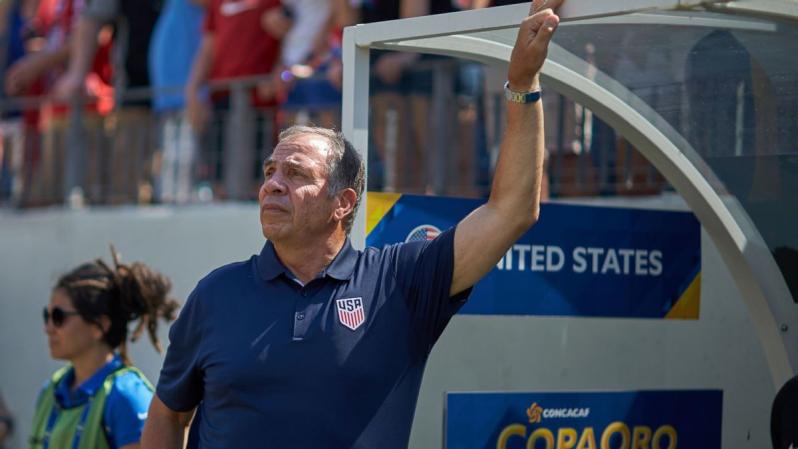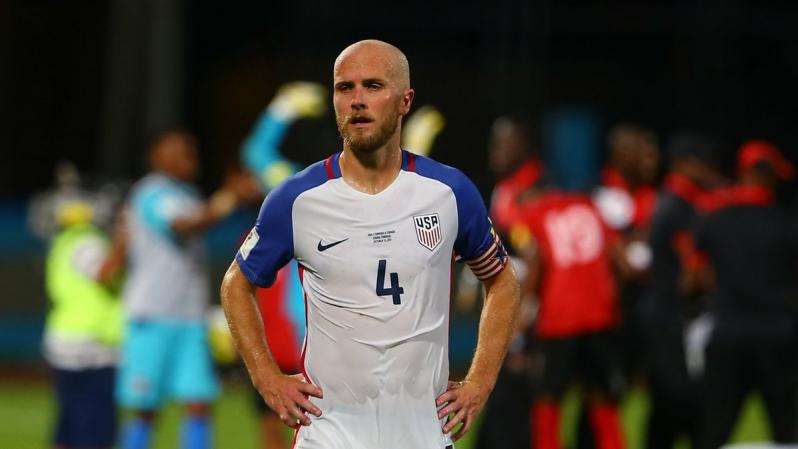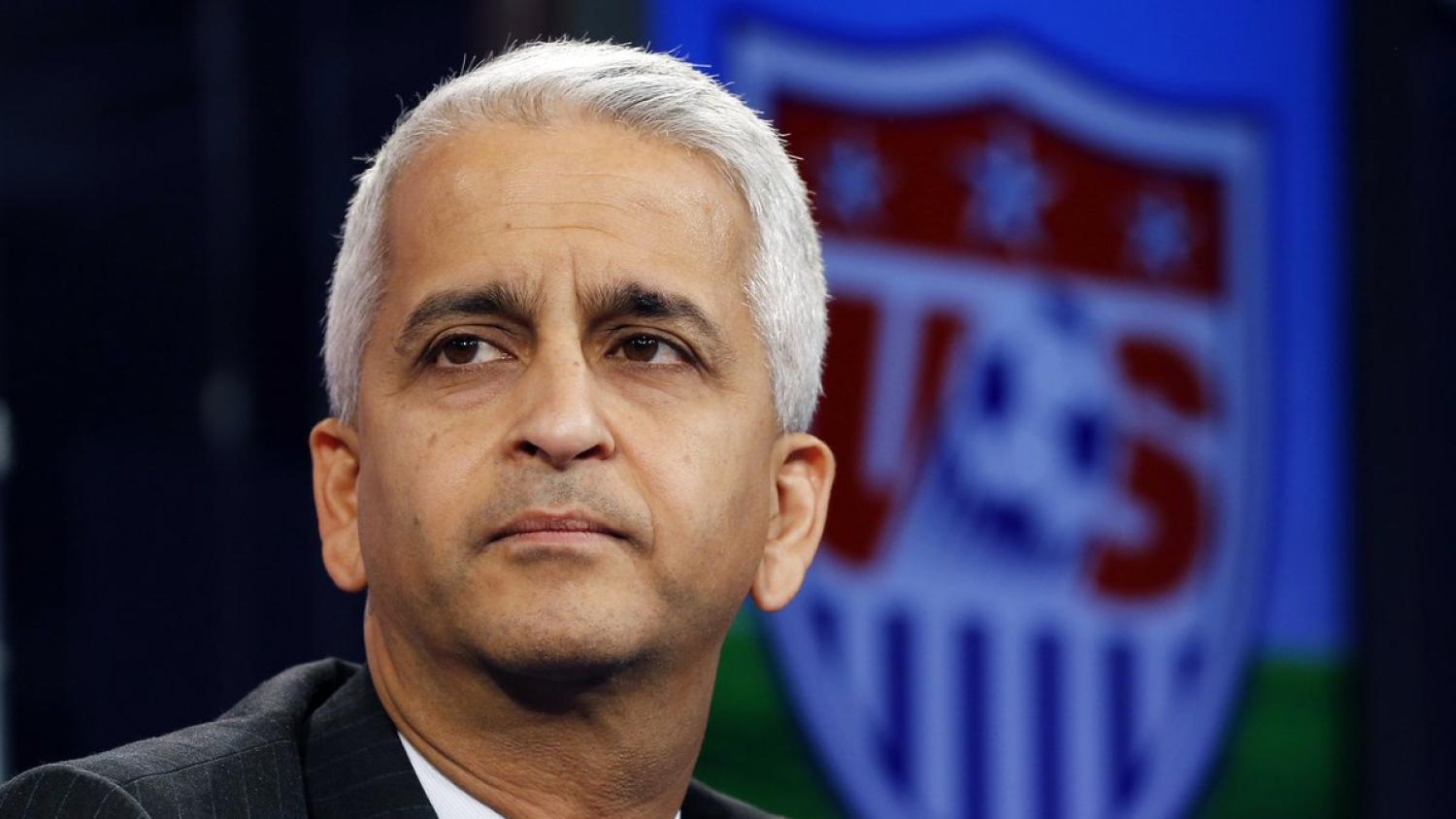Sunil Gulati, president of U.S. Soccer, just oversaw the most catastrophic defeat in U.S. Men’s National Team history, with the coaches he hired failing to get the U.S. to the 2018 World Cup. But Gulati was defiant Friday, saying he would not resign and made no indication he would not seek reelection in February.
Gulati fielded questions over the USMNT’s failure on Friday morning and most of them involved whether he planned to continue to as president. With a mixture of arrogance, naiveté and boldness, Gulati gave no credence to the idea he is not the right man to run U.S. Soccer. (You can hear highlights of the conference call below.)
“I take full responsibility,” Gulati said of missing the World Cup, before adding in the same breath: “No, I don’t plan to resign and it’s not the right day to talk about my personal future plans in terms of the federation’s presidency.”
The United States failed to qualify for a World Cup (men’s or women’s) for the first time since 1986 after a stunning Tuesday saw the U.S. lose 2-1 to Trinidad and Tobago, Honduras beat Mexico 3-2 and Panama beat Costa Rica 2-1. Those results combined to send the Americans from third place in the final CONCACAF World Cup qualifying group to fifth, completely out of the running to compete in Russia next summer.
Bruce Arena, who replaced Jurgen Klinsmann as coach in December, resigned on Friday in a move that surprised no one. Arena had eight games to get at least 13 points and ended up with 12, winning three of the eight matches but losing twice in the final four qualifiers.

Bruce Arena. Photo: @SportinKansasRR | Twitter
Gulati hired Arena and Klinsmann and neither lived up to expectations. Klinsmann was supposed to bring about sweeping changes to U.S. Soccer but proved an incapable game-day coach. Arena was supposed to right the ship and avoid the unthinkable and while he came close, there’s no denying not making the World Cup is nothing short of failure.
“(Not) Qualifying is not acceptable — not acceptable to us, to our leadership, to our board and certainly to our fans, players and everyone else involved in the game,” Gulati said.
And yet, despite the unacceptable results, there has been no accountability as of yet, aside from Arena’s resignation.
Nearly half of the questions Gulati was asked by reporters on Friday involved his status as president of U.S. Soccer including this terse exchange:
Question: “Can you understand how people feel someone else should be in that position?”
Answer: “Sure, I can understand the frustration with people, sure.” Dead air.
Gulati sounded like a guy in a relationship with a girl he wants to stay with but can’t give any good reasons as to why they should stay together. Just because other guys would have broken up with you doesn’t mean I should. Just because I can’t get our relationship to the next level doesn’t mean we should break up. Just because your friends think I’m wrong for you doesn’t mean I think I’m wrong for you. We’ve got a vacation planned coming up so why would we break up now? You’re in a better place than you were when we started dating so why would we split up?
It was a bit of a broken record and while Gulati may be one of the most experienced administrators in U.S. Soccer today, it seems clear after Tuesday’s debacle something must change. Regardless of how fine the margins were, close doesn’t cut it at the highest level. Gulati should know that.
It’s feasible Gulati runs for reelection next year and does not succeed but it’s also likely he gets reelected again. He’s the most powerful man in soccer in the country and given his status with FIFA (he’s on the FIFA Council) and the 2026 World Cup bid, he’s not going away anytime soon. But his defiance over maintaining the same role in which he has overseen the worse failure in U.S. soccer history is misguided and could be harmful for U.S. Soccer going forward.
Gulati did talk about things that didn’t involve himself, namely that the USMNT will play a couple friendlies in November, at least one of which (and possibly both) will be in Europe. An interim coach will be named in the next seven to 10 days for those matches.
As for a longterm coach, Gulati said he’s not even looking for a four-year commitment from anyone by February or March. It would make sense to appoint an interim coach for the November friendlies and beyond and then wait until after the World Cup to see what coaches become available.
Tab Ramos, who Gulati mentioned a few times Friday, would seem an obvious candidate for the interim job given his role as youth coach and technical director and could be considered for the full-time job. But at this point it’s anyone’s guess as to who will take the U.S. through its next World Cup qualifying campaign. Gulati may not even be around to make the decision if he doesn’t see reelection or fails in a reelection bid.
As for questions of how U.S. Soccer will learn from this defeat and make improvements going forward, Gulati gave few definitive answers. “We’ll look at it” was a common refrain. To be fair, a week ago no one expected to be in this position so it will take time to determine what exactly went wrong and how best to fix it, but some clues from the man at the top would have been nice three days after the fact.
U.S. Soccer will not disappear because it missed the World Cup. Gulati said the USMNT will continue to play during every open FIFA date, even if there is nothing to play for. The team will likely undergo significant changes in personnel, to be partially determined by who is named the longterm coach.

USMNT captain Michael Bradley. Photo: @goal | Twitter
But on Friday there was a lack of accountability. Saying you take responsibility doesn’t mean you take accountability. It’s like a kid telling his mom he’s sorry for not cleaning his room and then not going back and cleaning his room. The apology means nothing without action.
U.S. soccer fans, who were not happy on Tuesday and don’t ever want to feel like that again, want meaningful action. Friday, they got none.





